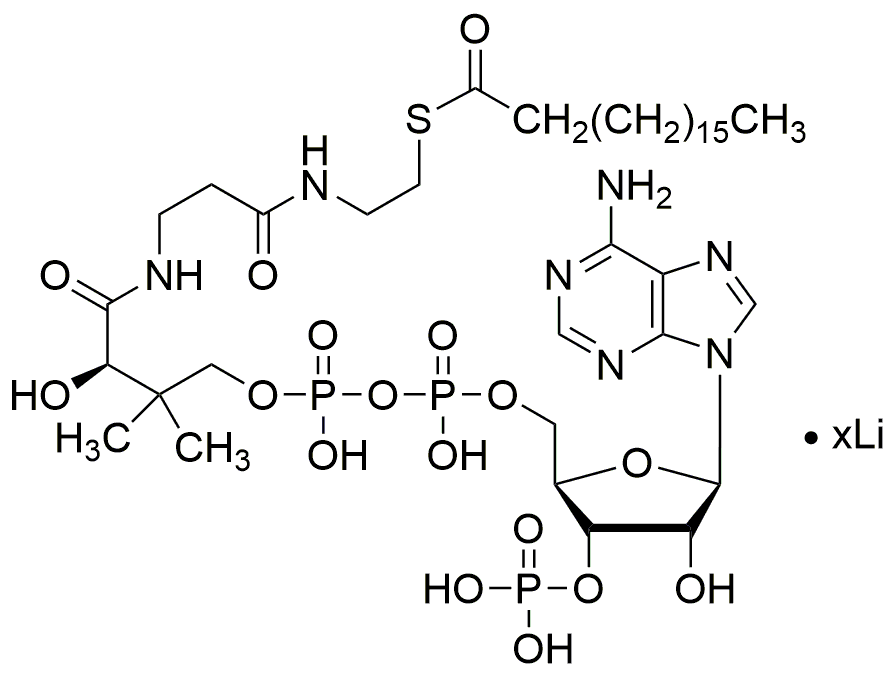Stearoyl coenzyme A lithium salt is widely utilized in research focused on:
- Biochemical Research: It serves as a substrate in enzymatic reactions, particularly in studies involving lipid metabolism and fatty acid synthesis, helping researchers understand metabolic pathways.
- Pharmaceutical Development: This compound is used in drug formulation processes, especially for creating liposomal drug delivery systems, enhancing the bioavailability of therapeutic agents.
- Cosmetic Industry: It acts as an emollient and thickening agent in skincare products, providing moisturizing benefits and improving product texture for better consumer experience.
- Food Industry: Employed as a food additive, it can enhance the stability and shelf life of certain products, making it valuable for food manufacturers aiming for quality and safety.
- Biotechnology: The compound is utilized in the production of biofuels and bioplastics, contributing to sustainable practices and reducing reliance on fossil fuels.
General Information
Properties
Safety and Regulations
Applications
Stearoyl coenzyme A lithium salt is widely utilized in research focused on:
- Biochemical Research: It serves as a substrate in enzymatic reactions, particularly in studies involving lipid metabolism and fatty acid synthesis, helping researchers understand metabolic pathways.
- Pharmaceutical Development: This compound is used in drug formulation processes, especially for creating liposomal drug delivery systems, enhancing the bioavailability of therapeutic agents.
- Cosmetic Industry: It acts as an emollient and thickening agent in skincare products, providing moisturizing benefits and improving product texture for better consumer experience.
- Food Industry: Employed as a food additive, it can enhance the stability and shelf life of certain products, making it valuable for food manufacturers aiming for quality and safety.
- Biotechnology: The compound is utilized in the production of biofuels and bioplastics, contributing to sustainable practices and reducing reliance on fossil fuels.
Documents
Safety Data Sheets (SDS)
The SDS provides comprehensive safety information on handling, storage, and disposal of the product.
Product Specification (PS)
The PS provides a comprehensive breakdown of the product’s properties, including chemical composition, physical state, purity, and storage requirements. It also details acceptable quality ranges and the product's intended applications.
Certificates of Analysis (COA)
Search for Certificates of Analysis (COA) by entering the products Lot Number. Lot and Batch Numbers can be found on a product’s label following the words ‘Lot’ or ‘Batch’.
*Catalog Number
*Lot Number
Certificates Of Origin (COO)
This COO confirms the country where the product was manufactured, and also details the materials and components used in it and whether it is derived from natural, synthetic, or other specific sources. This certificate may be required for customs, trade, and regulatory compliance.
*Catalog Number
*Lot Number
Safety Data Sheets (SDS)
The SDS provides comprehensive safety information on handling, storage, and disposal of the product.
DownloadProduct Specification (PS)
The PS provides a comprehensive breakdown of the product’s properties, including chemical composition, physical state, purity, and storage requirements. It also details acceptable quality ranges and the product's intended applications.
DownloadCertificates of Analysis (COA)
Search for Certificates of Analysis (COA) by entering the products Lot Number. Lot and Batch Numbers can be found on a product’s label following the words ‘Lot’ or ‘Batch’.
*Catalog Number
*Lot Number
Certificates Of Origin (COO)
This COO confirms the country where the product was manufactured, and also details the materials and components used in it and whether it is derived from natural, synthetic, or other specific sources. This certificate may be required for customs, trade, and regulatory compliance.


